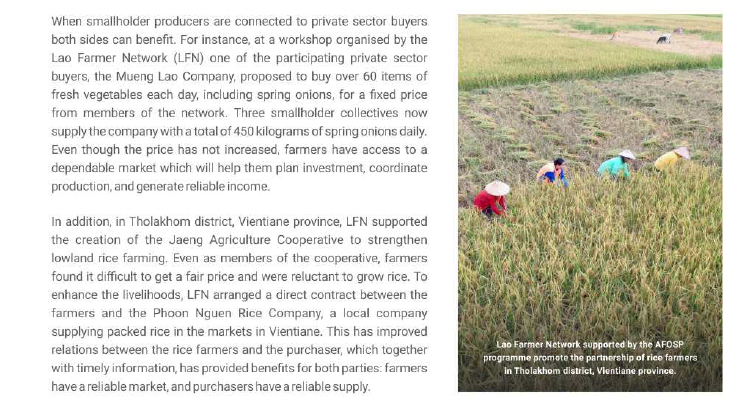Five stories from AFOSP are featured in the 2020 edition of the EU-ASEAN Blue Book which was launched virtually on 8 May 2020 in time for Europe Day celebration of the EU delegation to the ASEAN.
Watch the launch here: https://web.facebook.com/EUinASEAN/videos/269299374204965/
Download the EU-ASEAN Blue Book 2020: www.asiapacificfarmersforum.net/wp-content/uploads/2020/05/EU-ASEAN-Blue-Book-2020.pdf
Cooperative Harmony
Farmers in ASEAN Member States can benefit from regional integration when national agricultural cooperatives are aligned with the Action Plan for the ASEAN Roadmap 2019-2025. Two regional workshops in March and September 2019, organized by the EU-funded ASEAN Farmers’ Organisations Support Programme, brought together important stakeholder in the region: the ASEAN Centre for the Development of Agricultural Cooperatives (ACEDAC), the ASEAN Secretariat, the ASEAN Sectoral Working Group on Agricultural Cooperatives (ASWGAC), farmers’ organisations, agri-agencies, the private sector. Important areas to be further developed are institutional capacity building, competitiveness, access to finance, and access to markets.
“I believe we can find effective ways to strengthen the involvement of agricultural cooperatives in implementing the Action Plan. ASEAN Member States working in collaboration with all stakeholders will be key to achieving this.”
Mya Myo Swe, Representative of ASWGAC Myanmar
Brewing Up Value
Southeast Asia has the ideal climate and geography for coffee cultivation. With a strong coffee culture and expertise in production, a thriving industry has emerged. The ASEAN Community Vision 2025 also acknowledged coffee as a natural starting point for agricultural cooperatives to engage in global value chains. As part of the EU-funded AFOSP, an exchange visit was made to Pakse, Lao PDR in November 2019, which aimed to introduce coffee cooperatives to value chain management and geographical indications (GI) certification. Participants discussed challenges such as market access and learned about best practices on fair trade certification, cooperative business management, and international marketing. A field visit demonstrated how to make value-added coffee products such as soaps, lip balm, and coffee jam, enabling participants to expand their businesses.
“We recognize that cooperative work plays an important role in stimulating the socio-economic development of many countries and is vital to reducing poverty and ensuring sustainability.”
Kongkeo Vongpaseuth, Director General of DRDC, Ministry of Agriculture and Forestry of Lao PDR
Connecting Farmers and Buyers (Lao PDR)
When smallholder producers are connected to private sector buyers both sides can benefit. For instance, at a workshop organized by the Lao Farmer Network (LFN) one of the participating private sector buyers, the Mueng Lao Company, proposed to buy over 60 items of fresh vegetables each day, including spring onions, for a fixed price from members of the network. Three smallholder collectives now supply the company with a total of 450 kilograms of spring onions daily. Even though the price has not increased, farmers have access to a dependable market which will help them plan investment, coordinate production, and generate relatable income.
In addition, in Tholakhom district, Vientiane province, LFN supported the creation of the Jaeng Agriculture Cooperative to strengthen lowland rice farming. Even as members of the cooperative, farmers found it difficult to get a fair price and were reluctant to grow rice. To enhance the livelihoods, LFN arranged a direct contract between the farmers and the Phoon Nguen Rice Company, a local company supplying packed rice in the markets in Vientiane. This has improved relations between the rice farmers and the purchases, which together with timely information, has provided benefits for both parties: farmers have a reliable market, and purchasers have a reliable supply.
“Working with Phoun Nguen Company is good because they listen and are willing to help us deal with different challenges and problems. We hope to continue the partnership.”
Khampha, Head of Jaeng Agriculture Cooperative
Smell the Coffee (Myanmar)
U Zaw Myo Naing is a coffee farmer from Hpa Yar Gyi Kone village, Shan State, Myanmar. He owns six acres of land where for the past 10 years he has successfully cultivated organic Arabica coffee beans but has lack skills to add value to his production. After joining the Agriculture and Farmers Federation of Myanmar (AFFM), he received training through the EU-funded AFOSP which included attending a coffee forum in the Philippines. There he learned new production techniques and how other countries package their coffee products. When he returned to Myanmar, he started roasting his coffee beans at the optimum temperature, grinding the roasted beans more efficiently, and improving his packaging. Originally, U Zaw Myo Naing produced 50 boxes of coffee from 50 kilograms of roasted coffee beans. Now he is able to make 2,000 packs out of 100 kilograms.
“All smallholder farmers like me need knowledge and skills in sustainable agriculture to help increase our income and improve our livelihoods.”
U Zaw Myo Naing, Coffee farmers, Shan State, Myanmar
A Sweet Way to fight Poverty (Thailand)
Twenty-five smallholder farmers in the Network of People’s Organisations for Bantad mountain range in the southern province of Trang in Thailand have formed a collective to diversify and protect their incomes when the price of rubber, the traditional local crop, falls. The initiative, supported by the EU-funded ASOF, involves switching from a cash crap monoculture to an agro-ecological production system involving local bees from being fed with nectar from coconuts, betel nuts, coffee trees, and mangoes. In 2019, the members doubled the number of hives and harvested more honey during the summer as a result. The expansion is gradual in order to ensure that production remains entirely natural by, for example, ensuring the plantation where the bees are kept is chemical-free. The collective is also working to improve the packaging and product quality of their honey.
“I earned a little from producing rubber, so now I grow other trees and fruit without using chemicals and keep bees. We use local bees and we have rules to ensure that our bees are kept naturally. This means our customers trust the quality of our honey and demand is higher than our output.”
Khuk Pheuakchai, Leader of the Honey Collective
Download the EU-ASEAN Blue Book 2020: www.asiapacificfarmersforum.net/wp-content/uploads/2020/05/EU-ASEAN-Blue-Book-2020.pdf




Comments are closed